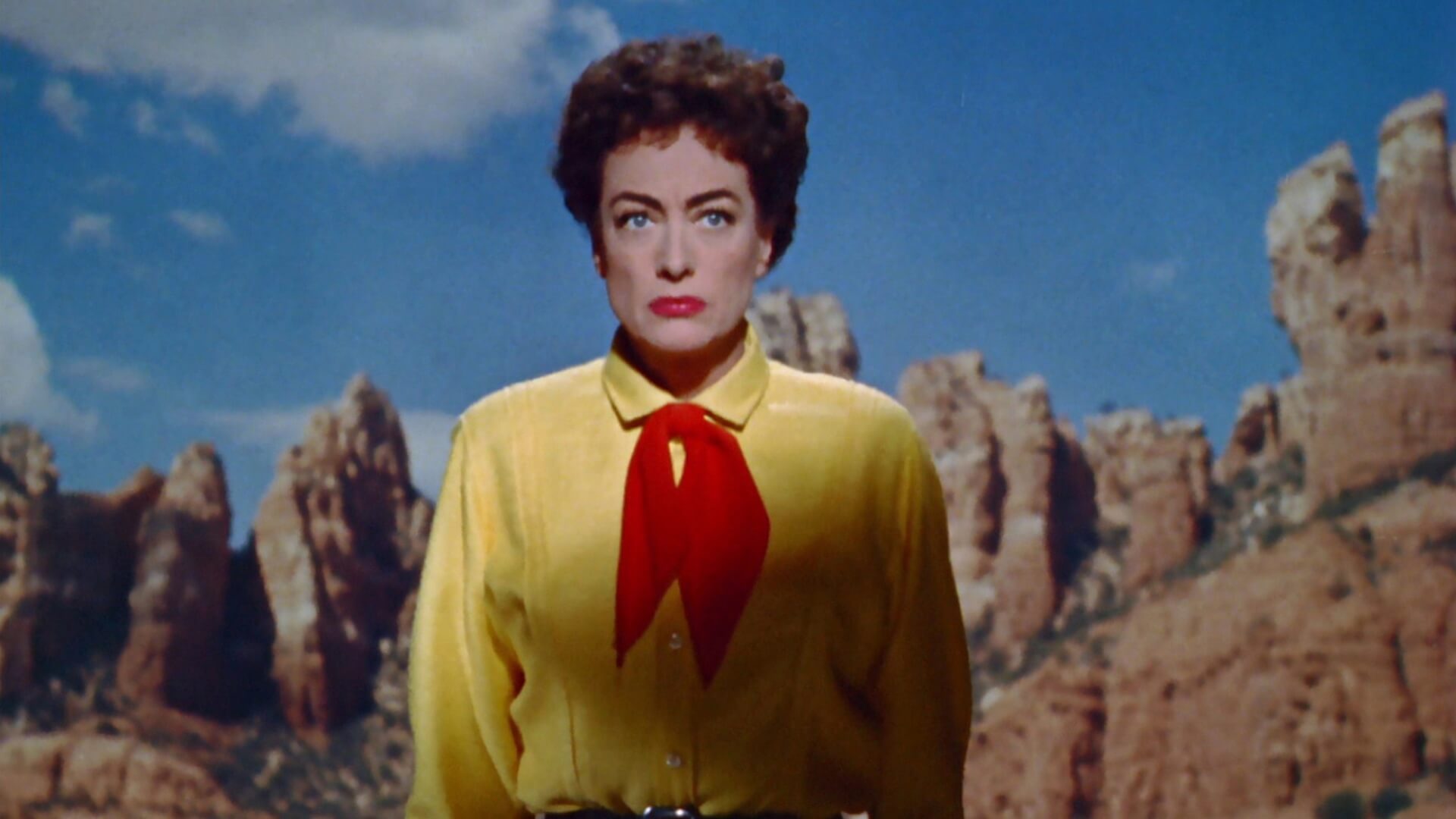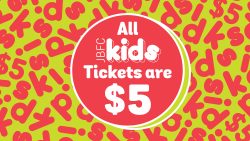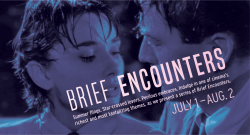Posted February 10, 2016
Saddle Up Saturdays: A Conversation About Westerns
By JBFC Marketing Assistant Sarah Soliman
From now until June 11, we’re all about Westerns at the JBFC. Saddle Up Saturdays with Jonathan Demme got started on February 6, with a screening of Sam Peckinpah’s 1965 film, Major Dundee. Before that screening I sat down with the JBFC’s Development Associate, Genevieve Oliver, to discuss some of our favorite Westerns, how revisionist Westerns update and challenge traditional cultural mythologies, and why we think this genre endures and continues to have an important place in American culture.
Sarah: Now that we’re recording, you had started talking about Johnny Guitar.
Gen: To me an amazing thing about Johnny Guitar is how it’s become this really iconic queer Western.
Sarah: The first time I saw it I didn’t know that it had that reputation, and I remember watching Joan Crawford and being so amazed. Forget being the most amazing woman. She’s the most amazing character in a Western.
Gen: Something I’ve always been really interested in about women in Westerns, and femininity and American mythology, is how the landscape is feminized. Women in Westerns only have two roles. You can be the wife or the prostitute with the heart of gold. But then there’s the landscape, which is capable of so much, which is feminized all the time, and it’s the most powerful, iconic element.
Sarah: That’s such an interesting observation.
Gen: I like to think of landscape in Westerns as a Taming of the Shrew metaphor. Plenty of men, just regular men, can’t tame the landscape, but a certain kind of man…
Sarah: You need John Wayne to come in and do it.
Gen: In American mythology in general the feminine is derided and shamed, but also upheld as this sacred tower.
Sarah: That’s something that so obviously still exists today, it clearly continues to play itself out. So it’s interesting to say that a feminized landscape can be incredibly powerful within these films, but when it comes to the actual lives of women, whether that’s film characters or real life, it’s not like that power transfers over.
Gen: Which is one of the most disappointing elements of the myth. One of the things I think about a lot is in revisionist Westerns how the structures of the myth when it comes to everyone who is left out of, or whose stories are faked in classic Westerns, in revisionist Westerns get more exposure.
Sarah: With classic Westerns I also think we might be tapped out on telling stories about the relationships that white men have to the landscape and to the Native populations, and it’s interesting to see what some of those other relationships might be.
Gen: I’m thinking about that scene in Meek’s Cutoff where she encounters the Indian and you see her run back to camp and load the shotgun. You see the whole scene because it’s one take, and you see how long it takes her to load the gun, to fire into the air. I love that because usually you just see the guys with pistols flying. The actual process is so different and so much of an undertaking.
Sarah: You imagine something like The Searchers—we don’t see the scene where they lay siege to the house, when you think of all those women and children being murdered you realize women aren’t taught to fight and protect themselves in that way, and in an environment where that would have been a useful, sometimes a lifesaving skill.
Gen: That’s a phenomenal movie. It’s the best John Ford Western and the best John Wayne Western because it’s almost finally getting at the grayness of the characters. Our heroes aren’t unequivocally good guys, you can’t sympathize with them all the time, and they’re not necessarily doing the right thing and making the right decisions. But to return to the idea of landscape, something else interesting about the Saddle Up Saturdays films, is how many different landscapes we’re seeing. A lot of these are classic Monument Valley Westerns, but we have Utu, the New Zealand one, and McCabe & Mrs. Miller which takes place in the North West.
Sarah: And you haven’t seen that yet.
Gen: I haven’t! I’ve always wanted to see it, because having lived in the North West it’s so potent. The symbolic quality of the land in the North West is really cool. And Mrs. Miller is an opium addicted madam. It surprises me that people don’t talk more about how opium addiction was a big problem in the West. I guess no one thought it was a problem until later.
Sarah: It’s one of the things I liked a lot about Deadwood.
Gen: Yeah it’s the best thing about Deadwood! You get that this has been a problem in American for a lot longer than people want to talk about.
Sarah: You definitely get that in McCabe & Mrs. Miller. Her opium addiction really contributes to the melancholy tone of that film.
Gen: Have you read Blood Meridian?
Sarah: I’ve started it a few times but it’s so gruesome I always end up putting it down.
Gen: I just started rereading Blood Meridian for like the 15th time. My copy is water-stained and full of writing. It’s my favorite novel despite the fact it’s so disturbing, because it’s one of the best Westerns. Our American experience of the West is our process of colonization. And like anyone else’s colonial process we did terrible things, and now we don’ talk about what we did. Blood Meridian is told in a way that is so mythic. Cormac McCarthy’s description of the landscape is of this hellish nightmare, and I think it mirrors the way a lot of cinematographers treat Westerns. Lines from it sometimes get stuck in my head, like when he talks about the “blood slaked waste.” It’s so vivid. And that’s a true story. John Glanton was a real guy and Americans were really hired to scalp Native Americans. It forces you to come to terms with the fact that it’s real. And that’s why I think Westerns still have a lot of value. Americans will take Westerns very seriously. We are very sensitive about Westerns because they encapsulate our whole system.
Sarah: The most privileged form of storytelling in this country is the Western.
Gen: It’s the only thing we made up. But people only privilege certain stories as being real American stories. So many cowboys were Black. And when people who haven’t gotten to have an American story get the chance to have one, people get upset. And that’s why I’m so excited about the films we’re showing. We’re showing Rosewood!
Sarah: It’s one of the reasons I’m so excited to see The Scalphunters. It’s got Ossie Davis, and it actually addresses slavery. It’s interesting that that’s directed by Sydney Pollack, who isn’t necessarily thought of as a director of Westerns. It’s interesting to see what people who don’t usually work in this genre can do with it. Which brings us back to Johnny Guitar, where you have Nicholas Ray, who for my money is the greatest American director.
Gen: What else did he do?
Sarah: Rebel Without A Cause.
Gen: That adds another angle. There are so many great Westerns by contemporary directors, like the Coens, who are considered auteurs. It makes me think of the divide between literary fiction and genre fiction. Even if they are literary, Westerns, sci-fi, crime are considered low brow by virtue of their genre. I find it really weird because everything about American mythology is visible in Westerns. Then the good revisionist Westerns are the ones that challenge the mythology, using the form. Where you have denied us stories we are telling stories.
Sarah: That’s clearly on Jonathan Demme’s mind when he picked these films. He talks about this in his letter about the series. And it brings up some tension, because we’re showing movies that challenge the mythology and make visible people who have previously been invisible, but at the same time we want to have fun with these movies. They’re Westerns! So it makes for an interesting balance to try to sit with.
Gen: I think so too. American culture is like an iceberg with mostly while male narratives at the top, and there’s this massive thing underneath that we don’t talk about. When you know to look for that, its absence tells you something. Having Westerns where you see a hint of people of color, or women, people who are on the outskirts or are treated badly, it’s a hint at this great unsaid. When you think of it like that it’s like all American literature is gothic, because we’re always hiding something.
Sarah: Off the top of my head I can’t think of a Western that stars a Native American actor. Utu is New Zealand’s version of that, but there’s also this Australian film Red Hill. The main character is still white, but ultimately it’s the revenge story of an aboriginal man. As the movie goes on you learn the truth about what the police in this community did to this man, and it’s really his story. Why don’t Americans have that movie?
Gen: That’s a good question.
Sarah: I’d also like to see a Western that focuses on Mexicans. You mentioned there were a lot of Black cowboys, and the same goes for Mexican cowboys. I’d like to see someone really explore that.
Gen: White cowboys were in a minority by a large margin. This conversation showing that there’s so much to talk about with Westerns. We can approach them from so many different places.
Sarah: So much can still be mined from this genre.
Gen: It’s still so relevant. It’s so important to watch Westerns as an American. It tells you so much about our culture, our history. To me, Westerns show you so much about things that Americans fear. We fear the Other, and being erased. We fear being deleted. A huge anxiety of ours is how we’re going to be swallowed back up into the landscape. Which is inevitable. Looking back towards our films, I’m excited to watch The Shooting and Ride in the Whirlwind. Those are Acid Westerns? That’s my favorite genre.
Sarah: Yeah, I think, The Shooting is considered the first Acid Western. They seem to be like the epitome of late 60s Westerns.
Gen: That reminds me I recently watched Butch Cassidy and the Sundance Kid for the first time. Susan Sarandon said “wouldn’t it be great if they kissed at the end?” They’re just bickering, and they clearly love each other so much! They just bicker until the moment they die.
Sarah: And Etta is this go-between for them. They both love her, but actually she’s like a conduit between them. They can’t be in love with each other so they’re in love with her instead. Butch Cassidy is probably my favorite Western.
Gen: Mine might be The Good, the Bad and the Ugly. And we’re showing Once Upon a Time in the West. It’s cool that Sergio Leone, one of the best Western directors, and Ennio Morricone, the best Western composer are Italian. And they’ve become classics.
Sarah: That’s an area to explore more. We’ve been talking about Westerns as American stories, but this series includes all these wonderful international interpretations. By the way, if you see Tears of the Black Tiger I’d like to know what you make of that, because when you think of Thailand you’d be hard pressed to find a landscape further from traditional Westerns. Anyway, we’re starting on Saturday with Major Dundee, which I haven’t seen, but I like Peckinpah a lot.
Gen: Major Dundee is a Civil War Western. There’s so much related to the Civil War and Western expansion that doesn’t get talked about. The Confederates used to smuggle their cotton through Texas and Mexico. When the Union blockaded the Eastern seaboard they brought cotton overland through Mexico. That’s why they were so intent on keeping Texas. It’s a fascinating part of history. There’s so much we don’t learn about. There’s so much fascinating history in the West during the Civil War.
Sarah: And of course so many Western heroes are former Confederate soldiers. There’s this sense that they’ve been beaten down by life. They’ve lost their war, so now they have to win this next one.
Gen: So we have a Civil War Western that we open the series with, then The Scalphunters, Man of the West with Gary Cooper, Shanghai Noon. We’ve got our beloved Johnny Guitar. Utu which we’re jazzed about. The Law and Jake Wade.
Sarah: I’m excited for The Law and Jake Wade. I love Richard Widmark. Apparently he was in enough Westerns to be inducted into a cowboy museum, but I’ve never seen him in a Western. I really think of him as a New York gangster.
Gen: That’s a similar thing as when we were talking about Sydney Pollack before.
Sarah: Bringing new blood in, yeah. That’s something we’ve got a lot of in this series. Not just—and we do have El Dorado with John Wayne, or Gary Cooper in Man of the West—but you’re not just seeing the same actors all the time.
Gen: Then we’ve got Rosewood. That’s again, if you take out that this is a Black community threated by white people it could be a classic western story of a white community threatened by Indians. To elevate this American story into the pantheon is exciting.
Sarah: And probably more accurate than a lot of other Westerns. I’m very interested in Westward the Women, which, when I first heard the plot, all these women moving out West to find husbands, I was sort of suspicious of. But after I finally watched the trailer and read about the movie it sounds like there’s good stuff there.
Gen: Forty Guns starring “Barbara Stanwyck as a powerful landowner who rules her Arizona county with an iron fist.”
Sarah: It sounds like we’re moving back into Joan Crawford territory.
Gen: She’s like a femme fatale. That’s a topic! The Western femme fatale.
Sarah: Especially with an actress like Barbara Stanwyck, who is so well known for Double Indemnity. It’s great to have characters who fit a femme fatale mold but aren’t prostitutes. Then we close with Ride the High Country.
Gen: Also Peckinpah. I’m very excited about that. It’s a good end point for the series.
Sarah: Sam Peckinpah makes me think about what you said about Blood Meridian being a more truthful account of Westward expansion. One of the directors who does strive for honesty about violence is Peckinpah. It’s going to be an interesting few months with these films.
Saddle Up Saturdays is currently running at the JBFC, with screenings every Saturday at noon. Gen and I will be checking back in throughout the series to talk more about this compelling slate of films. Tickets are now on sale!



